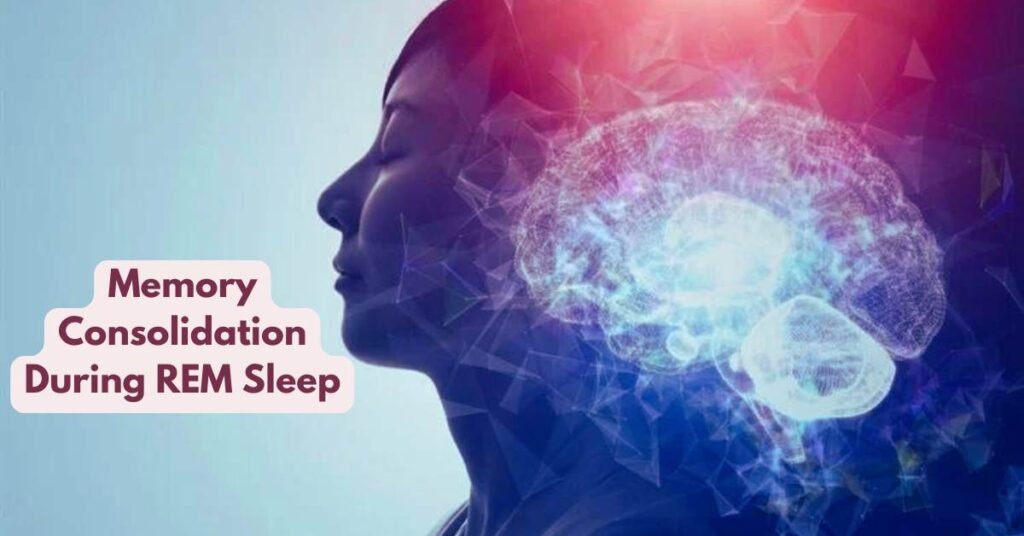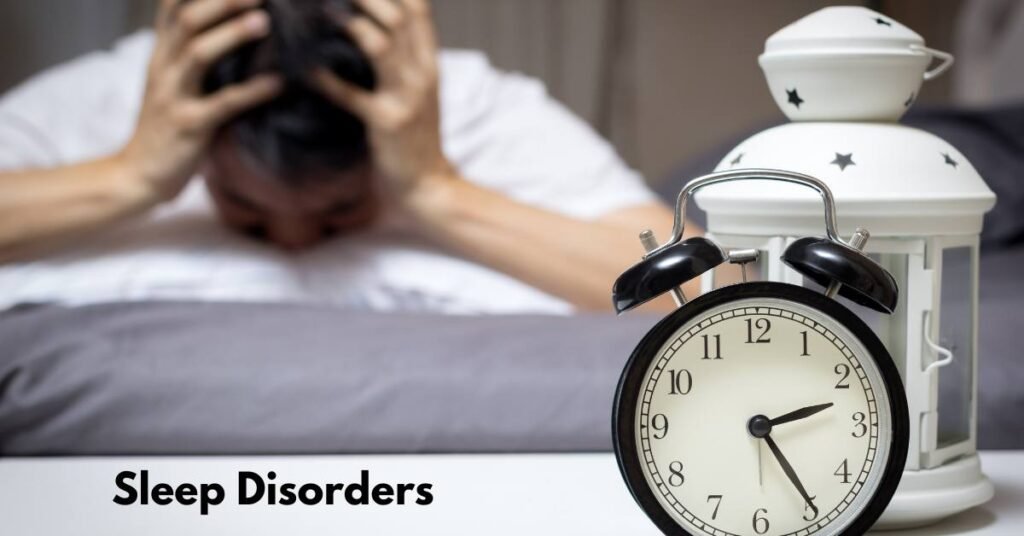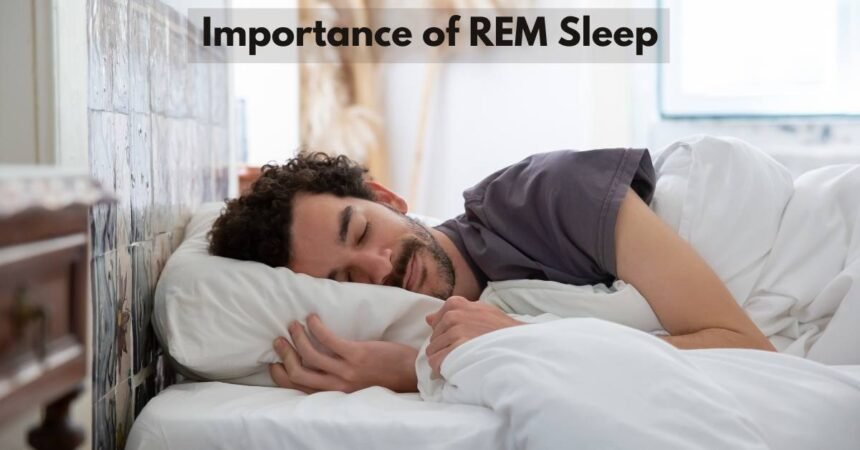Imagine waking up from a dream that felt so vivid, it was as if you were living it. Those moments, where our mind paints pictures during sleep, aren’t just whimsical experiences but crucial golden hours for our brain’s restoration. Remember the last time you had a full, restful night’s sleep? How did your mind and body feel the next day? Probably more focused, emotionally balanced, and ready to tackle the day. That’s the power of REM sleep, an often underestimated yet essential stage of our sleep cycle that has profound effects on our overall well-being.
The importance of REM sleep in maintaining overall health is huge. It helps with memory consolidation, emotional processing, and restoring our brain function from the day’s toll. It’s amazing to learn that REM sleep makes up about 25% of our sleep, with the rest being non-REM stages1. This balance is key, with most REM sleep happening in the second half of the night2. Not getting enough REM sleep can really hurt our thinking skills and emotional strength.
Think about it: when we dream during REM sleep, our brain is hard at work. It sorts through memories, filters emotional experiences, and gives us a fresh start for tomorrow. We’ve all felt the foggy, sluggish state after a night of poor sleep or insomnia – a clear sign of how vital it is to get those good, long stretches of sleep1. To keep our minds sharp, our mood stable, and our memory strong, the role of REM sleep is huge1.
Key Takeaways
- REM sleep benefits include memory consolidation and emotional processing.
- REM sleep makes up about 25% of our sleep cycle1.
- Poor REM sleep may be linked to sleep disorders like insomnia1.
- Quality sleep cycles help restore brain function and emotional balance2.
- Aiming for 7.5 to 9 hours of sleep each night is best for health1.
What is REM Sleep?
REM (Rapid Eye Movement) sleep is a key stage in our sleep cycle. It’s filled with unique features and is crucial for our health. Knowing about it helps us see why sleep stages are so important.
Definition of REM Sleep
REM sleep is a vital part of our sleep, happening as the fourth stage. It’s a time of high brain activity, similar to being awake. This stage is when most dreaming happens, showing how vital REM sleep is for our emotions and thinking3.
Characteristics of REM Sleep
REM sleep stands out with its unique traits. Our muscles relax deeply, and our eyes move quickly, our brain stays active, and our breathing changes. It’s different from non-REM sleep, which has steady breathing and some muscle tone3. REM sleep makes up about 25% of our sleep, which is around 90-110 minutes a night4.
When Does REM Sleep Occur?
REM sleep starts 60 to 90 minutes after we fall asleep and happens several times during the night. These cycles get longer and more frequent towards the end of our sleep4. On average, we have four to six REM episodes each night4. Knowing this helps us see how crucial REM sleep is in our sleep cycle.
Stages of Sleep and Where REM Fits In
Understanding the sleep cycle is key to knowing how each stage helps our deep sleep health. Our sleep cycle has four stages: three non-REM (N1, N2, N3) and one REM stage. Each cycle lasts about 90 to 120 minutes and repeats four to six times a night567.
Overview of Sleep Stages
The cycle starts with NREM sleep, moving through stages N1, N2, and N3. Stage N1 is the lightest, lasting a minute to five, making up 5% of sleep time. It’s marked by theta waves6.
Stage N2 is deeper, lasting 10-25 minutes and making up 45% of sleep time. It’s important for memory consolidation, with sleep spindles and K complexes7. The deepest phase, N3, lasts 20-40 minutes, making up 25% of the night, crucial for recovery7.
NREM stages are vital for energy saving, self-repair, and recovery. This leads to feeling rested. Then, REM sleep starts about 90 minutes after falling asleep, lasting 10 minutes to an hour. It’s marked by rapid eye movement, high brain activity, and muscle paralysis to prevent acting out dreams67.
Differences Between REM and Non-REM Sleep
REM and non-REM sleep have different roles in our sleep cycle. Non-REM stages focus on rest and recovery, making up 75% of our sleep. Most of this is in stage N2, crucial for physical and mental rejuvenation5.
REM sleep, on the other hand, deals with brain functions like memory and emotions. It has unique brain wave patterns and muscle paralysis, ensuring we stay still. This stage is key for emotional health and processing stress6. Understanding these differences shows why we need both REM and non-REM sleep for good sleep health.
- Stage N1: 5% of total sleep time; light sleep characterized by theta waves.
- Stage N2: 45% of total sleep time; deeper sleep marked by sleep spindles and K complexes.
- Stage N3: 25% of total sleep time; deepest non-REM sleep with delta waves.
- REM Stage: Occurs approximately 90 minutes after falling asleep; associated with rapid eye movement and increased brain wave activity.
Age, lifestyle, and health affect sleep patterns and stage distribution. Older adults wake up more often, spending less time in deep sleep and REM sleep5.
Knowing about each sleep stage shows why good sleep habits are important. They help maintain deep sleep health and overall well-being.
Importance of REM Sleep in Maintaining Overall Health
REM sleep is key for brain health and sleep, playing a big part in our well-being. Studies show most adults need about two hours of REM sleep each night8. This time is crucial for our brain to repair and refresh itself.
REM sleep grows after learning in both animals and humans8. It helps with memory and processing feelings. REM sleep makes up about 25% of our sleep, with cycles lasting from 10 minutes to an hour9. These cycles are important for keeping our emotions in check and building resilience.
REM sleep has unique brain wave activity, muscle relaxation, and rapid eye movements10. These changes are vital for brain health and sleep quality. In adults, REM sleep gets longer as the night goes on, making us ready for the day ahead10.
Infants spend about eight hours in REM sleep daily, showing its importance for brain growth8. Adults need around two hours, and good REM sleep affects our daily life. It’s crucial for staying healthy.
REM sleep is more than just rest; it’s a key part of our sleep cycle. Its benefits, like emotional balance and energy, highlight its role in keeping us healthy and well.
Memory Consolidation During REM Sleep
REM sleep is key to memory consolidation. It helps decide what new learnings and skills we keep or forget. This stage of sleep boosts our mental agility and helps integrate new info.
How REM Sleep Aids in Memory
REM sleep helps by processing and organizing memories. The brain stays active during this stage, turning new experiences into lasting memories. Studies show that REM sleep is crucial for solidifying new learnings.

Studies on REM Sleep and Memory
Many studies link REM sleep to better memory consolidation. Stickgold, James, and Hobson found a strong link between REM sleep and remembering things better11. Aton et al. in 2009 showed how sleep helps change the brain for better memory12.
Wagner, Gais, and Born looked into how REM sleep affects learning and memory11. Antony et al. found that waking up to memories during sleep helps with learning new skills12. This shows how important sleep is for our minds and overall health.
Astill et al. analyzed a century of research and found better sleep means better thinking and fewer problems in kids12. This proves how crucial good REM sleep is for keeping our minds sharp at any age.
REM Sleep and Emotional Processing
REM sleep is key to understanding how our emotions are processed. It helps us deal with our feelings, making us stronger and more stable. This stage is important for our mental health.
Impact of REM Sleep on Emotions
REM sleep is crucial for managing our emotions. While we dream, our brain sorts through our feelings. This helps us stay in control of our emotions.
Poor sleep can hurt how we handle our feelings and affect our mental health. For example, research shows that bad sleep can lead to trouble with emotions in low-income women13. Also, studies found that REM sleep helps us react less strongly to emotional situations13.
If you found this helpful, you might also like our article on “Unlock the Health Benefits of a Consistent Sleep Schedule”.
Role of the Amygdala in REM Sleep
The amygdala, a part of the brain, is very active during REM sleep. It helps us deal with strong emotions and past traumas. This can make our daily life easier.
REM sleep affects how we feel by using different ways to handle emotions13. This shows how important sleep stages are for staying balanced emotionally.
REM sleep also changes our brain chemistry. It stops some systems and starts others, helping us process emotional memories14. This change is key for staying emotionally strong and mentally healthy.
Dealing with emotions during REM sleep helps us in many ways. It’s not just good for our minds but also for our mental health. Research shows that REM sleep is key for handling our feelings and staying mentally well13.
Brain Development and REM Sleep
Brain health and sleep are closely linked, especially in early development. Infants from 4–11 months need 12–15 hours of sleep, says the National Sleep Foundation15. The American Academy of Sleep Medicine agrees, recommending 12–16 hours15. REM sleep is key to brain growth.
REM sleep helps the brain make and trim neural connections. These are vital for growing cognitive and sensory skills16. It’s important for babies, teens, and adults alike.
Teens should aim for 8–10 hours of sleep each night, advises the National Sleep Foundation and AASM15. Getting enough REM sleep is crucial for brain health and emotional balance. Deep sleep is also vital for overall well-being and brain growth.
REM sleep does more than help with thinking. Poor sleep in young ones can lead to hyperactivity and emotional issues later, like anxiety and depression15. Early sleep problems can also slow down learning and reading skills16. So, deep and REM sleep are very important.
The high amount of REM sleep in early life shows its importance across species. It affects brain health and sleep patterns later on. Getting enough REM and deep sleep is key for healthy brain and emotional growth1516.
Impact of REM Sleep Deprivation
REM sleep deprivation affects our health in many ways, touching both our bodies and minds. It’s linked to sleep disorders, making things worse.
Effects on Physical Health
Not getting enough REM sleep can hurt our physical health. It can cause obesity, diabetes, and heart diseases17. Our immune system relies on REM sleep, so not getting enough can make us more likely to get sick.
Also, REM sleep helps us conserve energy. Without it, we might feel tired all the time and not be as productive.
About 50 to 70 million Americans have a sleep disorder, which affects their daily life and health17. Also, 30% of adults don’t sleep enough, showing how big a problem sleep deprivation is18.
Effects on Mental Health
REM sleep deprivation also hurts our mental health. It’s key for handling emotions, remembering things, and thinking clearly. Without it, our brains don’t work right, leading to problems with thinking, feeling, and mental health19.
People who don’t get enough REM sleep often feel more anxious and sad19. This can really hurt how we feel inside, showing why good sleep is so important.
Only 26% of teens sleep as much as they should, with many sleeping less than 6.5 hours on school nights17. This lack of sleep can really affect their mental and emotional growth.
Sleep Disorders Related to REM Sleep
REM sleep is a key part of our sleep cycle. Many sleep disorders are linked to this phase. It’s important to understand and address these issues for better REM sleep and overall health.
Common REM Sleep Disorders
Several sleep disorders affect the REM stage, hurting sleep quality and health. Narcolepsy causes too much daytime sleepiness and sudden muscle weakness. It happens when certain neurons in the brain are lost20.
REM Sleep Behavior Disorder (RBD) is another issue. It means you act out your dreams during sleep, which can hurt you or your partner21. Obstructive sleep apnea (OSA) also affects REM sleep. It happens when breathing stops and gets worse during this phase20.

Treatments and Solutions
Dealing with REM sleep disorders often means using medicines and changing your lifestyle. For narcolepsy, stimulants and sodium oxybate help with sleepiness and cataplexy20. RBD is treated with drugs like clonazepam or melatonin to lessen dream actions21.
CPAP therapy is great for OSA. It keeps airways open during sleep, improving REM sleep quality22. Changing your sleep habits and making your bedroom sleep-friendly also helps a lot21.
It’s crucial to spot and treat REM sleep disorders to lessen their effects. By getting the right treatment, we can greatly improve our sleep and health.
Tips for Improving REM Sleep
Creating specific strategies can greatly improve REM sleep. Start by setting a regular sleep routine. Also, make your sleep space better and get help for ongoing sleep problems. This will help you sleep better.
Healthy Sleep Habits
Healthy sleep habits are key for better REM sleep. Start by sticking to a regular sleep schedule, going to bed and waking up at the same time every day2324. Regular exercise of 20 to 30 minutes a day also helps improve sleep2324. But, avoid drinking alcohol before bed as it messes with your sleep, especially REM sleep232425. Try adding mindfulness meditation to your day to help with insomnia and better sleep quality24.
Environmental Factors
Creating a good sleep environment is also vital for quality sleep. Using white noise machines can help you fall asleep faster and stay asleep longer, which is good for REM sleep25. Also, make your bedroom calm and cozy by controlling the room’s temperature, reducing noise, and using blackout curtains. Avoid too much caffeine in the afternoon, as it can mess with your sleep25. Some supplements like melatonin, magnesium, and chamomile can also help improve sleep quality23.
When to Seek Professional Help
If you’re still having sleep problems even with good habits and a nice sleep space, get professional help. Chronic insomnia or unknown sleep disorders can really hurt your sleep and health23. Getting the right treatment is key to fixing any sleep issues, which can greatly improve your life23. A sleep specialist can give you tailored advice and suggest more ways to get better sleep.
Conclusion
REM sleep is vital for our health. It helps with brain growth, memory, and emotions. These are key for our daily life and long-term health26.
REM sleep makes up about 20–25% of an adult’s sleep and more than 50% of a baby’s sleep26. This shows how important it is for our brain and feelings from a young age.
Good sleep, especially REM sleep, keeps us healthy. Not sleeping enough can make us eat more and gain weight, which is bad for our bodies27. Adults need 7 hours of sleep to get enough REM sleep for good mental and brain health26.
To get better REM sleep, we should fix sleep problems and make our sleep area comfy. Following good sleep habits helps too. For tips on better sleep, check out HealthPoint Plaza27. Making REM sleep a priority boosts our health and happiness.
FAQ
Why is REM sleep vital for maintaining overall health?
REM sleep is key for brain growth, memory keeping, and feeling emotions. It helps fix brain functions, balance emotions, and keeps us well. We can’t ignore how important REM sleep is for our health.
What is REM sleep?
REM sleep, short for Rapid Eye Movement sleep, is a sleep stage with fast eye movements, relaxed muscles, and brain activity like being awake. This stage is vital for thinking and feeling emotions.
How would you define REM sleep?
REM sleep is a special sleep stage with brain activity like being awake. It has fast eye movements, vivid dreams, and muscle relaxation. This stops us from acting out our dreams.
What are the characteristics of REM sleep?
REM sleep has fast eye movements, changing brain waves, relaxed muscles, and odd breathing. This stage is known for its active brain and dreaming.
When does REM sleep occur?
REM sleep starts 60 to 90 minutes after falling asleep and happens several times during the night. Each cycle gets longer and lasts longer in the night’s second half.
What are the stages of sleep and where does REM fit in?
The sleep cycle has four stages: three non-REM and one REM. REM sleep is the last stage, with lots of brain activity and no muscle movement.
What are the differences between REM and non-REM sleep?
REM sleep has fast eye movements, lots of brain activity, and no muscle movement. Non-REM sleep has less brain activity, some muscle tone, and helps save energy. Non-REM has stages from light to deep sleep, ending with deep sleep that makes us feel rested.
How does REM sleep benefit brain health?
REM sleep helps with memory, feelings, and brain growth. It keeps thinking skills sharp by organizing and processing new info and feelings.
How does REM sleep aid in memory?
During REM sleep, the brain sorts and reorganizes memories, deciding what to keep. This stage is key for learning and remembering things.
What studies support the role of REM sleep in memory?
Studies on animals and humans show that more REM sleep helps with memory and learning. For example, rats learned mazes better with more REM sleep, and college students remembered more with it.
What is the impact of REM sleep on emotions?
REM sleep, with its vivid dreams, helps manage and understand feelings. It’s therapeutic for emotions, making us emotionally stable and resilient.
What role does the amygdala play in REM sleep?
The amygdala, key for feelings, is active in REM sleep. This helps us deal with feelings and supports mental health.
How does REM sleep contribute to brain development?
REM sleep is crucial for brain growth, especially in young ones. It helps make neural connections and clean up unnecessary ones, important for thinking and sensing.
What are the effects of REM sleep deprivation on physical health?
Not getting enough REM sleep weakens the immune system, saves energy, and messes with body processes. This affects our health and well-being.
What are the effects of REM sleep deprivation on mental health?
Not sleeping enough can hurt memory, thinking, and feelings. It shows how vital REM sleep is for staying mentally healthy and strong.
What are common REM sleep disorders?
Common REM sleep issues include REM sleep behavior disorder, where you act out dreams, and narcolepsy, with sudden muscle weakness and too much daytime sleep.
What are the treatments and solutions for REM sleep disorders?
For REM sleep problems, treatments range from drugs to changing daily habits to improve sleep. Getting expert advice is key for the right solutions to keep and boost REM sleep.
What are some tips for improving REM sleep?
Better REM sleep comes from regular sleep habits, a comfy sleep area, and daily habits that help sleep. Exercise and napping can also improve sleep cycles.
What environmental factors can improve REM sleep?
A quiet, dark sleep area helps improve REM sleep quality. Using supportive bedding and keeping the room cool also helps.
When should you seek professional help for sleep issues?
If sleep problems don’t get better with trying new habits, getting expert advice is a must. Finding out what’s causing sleep issues is crucial for fixing REM sleep.
Source Links
- https://www.thensf.org/what-is-rem-sleep/ – What is REM Sleep? – National Sleep Foundation
- https://www.sleepstation.org.uk/articles/sleep-science/rem-sleep/ – REM Sleep: Why is it important?
- https://www.healthline.com/health/how-much-deep-sleep-do-you-need – How Much Deep, Light, and REM Sleep Do You Need?
- https://www.sleepfoundation.org/stages-of-sleep/how-to-get-more-rem-sleep – 5 Ways to Get More REM Sleep
- https://www.ncbi.nlm.nih.gov/books/NBK526132/ – Physiology, Sleep Stages – StatPearls
- https://www.verywellhealth.com/the-four-stages-of-sleep-2795920 – The 4 Stages of Sleep (NREM and REM Sleep Cycles)
- https://www.health.com/stages-of-sleep-7494679 – What Do the Stages of Sleep Really Mean?
- https://www.sleepfoundation.org/stages-of-sleep/rem-sleep – REM Sleep: What It Is and Why It’s Important
- https://my.clevelandclinic.org/health/body/12148-sleep-basics – Controlled ZZZs
- https://www.ncbi.nlm.nih.gov/books/NBK19956/ – Sleep Physiology – Sleep Disorders and Sleep Deprivation
- https://www.ncbi.nlm.nih.gov/pmc/articles/PMC8760621/ – The REM Sleep–Memory Consolidation Hypothesis
- https://www.ncbi.nlm.nih.gov/pmc/articles/PMC3768102/ – About Sleep’s Role in Memory
- https://www.ncbi.nlm.nih.gov/pmc/articles/PMC7181893/ – Emotion, emotion regulation and sleep: An intimate relationship
- https://www.ncbi.nlm.nih.gov/pmc/articles/PMC2890316/ – Overnight Therapy? The Role of Sleep in Emotional Brain Processing
- https://www.ncbi.nlm.nih.gov/pmc/articles/PMC9111737/ – Early Life Sleep Deprivation and Brain Development: Insights From Human and Animal Studies
- https://www.hopkinsmedicine.org/health/wellness-and-prevention/the-science-of-sleep-understanding-what-happens-when-you-sleep – The Science of Sleep: Understanding What Happens When You Sleep
- https://www.ncbi.nlm.nih.gov/books/NBK19961/ – Extent and Health Consequences of Chronic Sleep Loss and Sleep Disorders – Sleep Disorders and Sleep Deprivation
- https://www.news-medical.net/news/20240704/Late-night-REM-sleep-loss-severely-impacts-brain-connectivity-new-study-reveals.aspx – Late-night REM sleep loss severely impacts brain connectivity, new study reveals
- https://www.nature.com/articles/s41398-024-02985-x – The impact of REM sleep loss on human brain connectivity – Translational Psychiatry
- https://www.ncbi.nlm.nih.gov/books/NBK531454/ – Physiology, REM Sleep – StatPearls
- https://www.psychiatry.org/patients-families/sleep-disorders/what-are-sleep-disorders – What are Sleep Disorders?
- https://www.verywellhealth.com/dream-deprivation-how-loss-of-rem-sleep-impacts-health-4159540 – A Dream Deferred? How Loss of REM Sleep May Impact Health and Learning
- https://www.healthline.com/health/healthy-sleep/how-to-get-more-rem-sleep – How to Get More REM Sleep: 8 Tips, Medications, and Supplements to Try
- https://healthcareassociates.com/how-to-get-more-rem-sleep/ – How to get More REM Sleep
- https://welltory.com/how-to-get-more-rem-sleep-8-science-backed-tips/ – How to Get More REM Sleep? 8 Science-Backed Tips – Welltory
- https://www.medicalnewstoday.com/articles/247927 – REM sleep: Definition, functions, and the effects of alcohol
- https://www.ncbi.nlm.nih.gov/pmc/articles/PMC8702162/ – REM Sleep: An Unknown Indicator of Sleep Quality

















